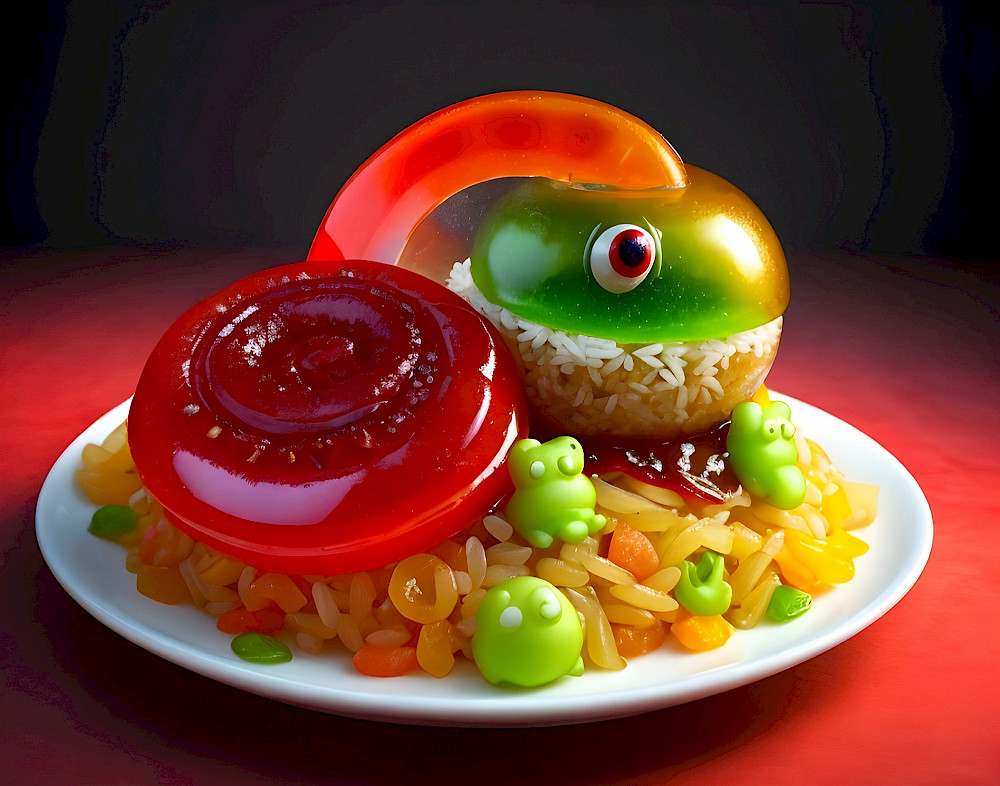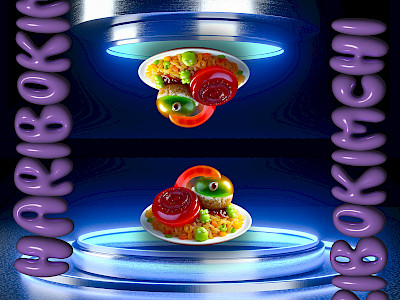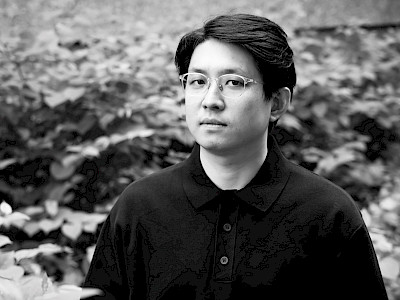10 — 12.05, 14.05, 15.05.2024
We regret to inform you that the premiere of Haribo Kimchi by Jaha Koo is unfortunately postponed to a later date due to family circumstances. Consequently, all performances at Kunstenfestivaldesarts are cancelled. Those in possession of tickets for these performances have been contacted by email and will receive a refund by bank transfer. Thank you for your understanding.
Aromas waft over from a steamy simmering soup, a knife blade hisses through spring onions, mushrooms sizzle on a scorching fire. In Haribo Kimchi, we find ourselves in a pojangmacha, a typical late-night snack bar seen on the streets of South Korea. There, we meet several lost souls: a YouTuber, an eel, a toad and a rice cooker. They take us on a culinary journey, exploring food culture as a language that reveals the structure of society. In a series of poignant absurdist anecdotes, they recount the diaspora of Kimchi culture, cannibalism during the great famine, the sour pain of unadulterated racism and the deep umami taste of home. Following the success of his Hamartia Trilogy (2021), which delved into the far-reaching imperialism in East Asia, South Korean theatre maker and composer Jaha Koo returns to Kunstenfestivaldesarts with a new creation. His patented hybrid style combines music, innovative video and robotic performers to craft a reflection on cultural assimilation with all its conflicts and paradoxes. In an exceptional performance that plays with all the senses, Koo forever alters our perception of food.
Haribo Kimchi
What is meant by Haribo Kimchi, the title of your newest creation?
I wanted to study identity and cultural differences through the history and current state of ‘food’. I wanted to think about diasporic identities, as well as how – in a capitalist world – food is the object of projections and strategies to become a cultural product. Hence the title, which juxtaposes and confronts these two disparate food items: Haribo, a well-known German brand of sweets; kimchi, a traditional Korean speciality.
How does this performance relate to The Hamartia Trilogy, which you’ve been working on for seven years?
In certain respects, notably the fact that I always create the music and videos for my pieces, Haribo Kimchi could be seen as an extension of it. But this show is marked by a desire to renew my artistic practice, particularly the way in which I project myself into the work. In the Trilogy, my personal stories were the main material, whereas here I am creating more distance between the work and myself. In a sense, Haribo Kimchi could be seen as a transitional process aimed at erasing myself from the work.
Who are the three characters accompanying you on stage and what imaginary world do they convey?
Seri is a rice cooker, who already played in Cuckoo (2017) and in The History of Korean Western Theatre (2020); Toad is an origami robot who played my child in the latter performance. A new character, a robot eel, makes his appearance in Haribo Kimchi. Each one will play their own role in relation to the themes addressed in the piece, and will question the different stories and different contexts. I must say that seeing my troupe grow like this fills me with pride and joy. I’ve always worked with a range of non-human artists. Seri, for example, is not just a prop but a robot performer with its own identity. With each new project, I introduce a new character and my troupe grows. After thinking of myself as a solitary author-performer, I gradually realised that I was operating as a theatre company in my own right, surrounding myself with non-human actors. Their involvement depends on the thematic concerns of each project. Since Haribo Kimchi explores food, including Seri was a natural choice. My fascination with food is deep-rooted and Seri embodies that interest. Its presence is a testament to how we transform mundane objects and food into powerful symbols of our collective and individual stories.
Haribo Kimchi is set in a pojangmacha. What role do these street food stalls play in South Korea?
There are several types. Some pojangmacha offer street food during the day, others serve simple dishes and drinks late at night. Since the early 2000s, many have disappeared – the government has driven them off the streets for reasons of hygiene, as well as issues concerning taxes and fees for occupying public space. The economic impact of Covid-19 has also wiped out many of them. I find these places incredible, unique. At night the pojangmacha can appear out of nowhere, serving people regardless of class, generation or gender, and then disappear like ghosts before dawn. They have no fixed address and do not exist in any database. They are ‘non-places’, as elusive as a liquid, and volatile, capable of wandering without a destination. It was while working on Haribo Kimchi that I discovered the different forms they could take and the various states and spaces they embrace. They seemed to me to be the most appropriate framework for sharing the stories I wanted to tell.
What stages do you go through to create your performances?
It’s always a long process, requiring a year of research and a year of production. During the first phase I gather information, conduct field studies, and develop the concept and theme of the piece, along with the directions that the music, video, and scenography will take. A number of other people are involved in this research: a technical team, a scenographer, a dramaturge, and the collaborators who accompany me in the field. At the end of this long period, we move to the rehearsal space. Given the extensive use of digital technology and the involvement of robot interpreters, a considerable amount of time is spent on fine-tuning. Creating one minute of performance takes countless hours and tests everyone’s patience. My team has become accustomed to this way of working, and I take great care to ensure that everyone looks after their mental and physical health, if only to be fit enough to move on to the next project.
You mentioned the “diaspora of kimchi culture”. What do you mean by this?
There are more Korean diasporas in the world than one might think. Their cultural environments and lives have evolved enormously over the generations, but one of the last things they will never give up is kimchi. They can lose their language but not their kimchi. On the other hand, as Korean culture gains renewed global interest and its cuisine becomes highly valued, it undergoes another process of transformation. This leads me to question what ‘authenticity’ means and who decides it.
What kind of audience do you have in mind when you write?
In general, I write and create my works for an international audience, which includes Koreans, because I believe that my stories and my journey can resonate in different cultures. But for the first time with Haribo Kimchi, I had in mind Koreans living abroad. This new perspective led me to adopt a different approach, one that looks at the unique experiences and identities of the diaspora as a means of enriching the understanding and reception of my work among Korean and non-Korean audiences alike.
- Interview conducted by Vincent Théval in April 2024
Presentation: Kunstenfestivaldesarts, Le Rideau
Concept, text, direction, music, sound & video: Jaha Koo | Performance: Jaha Koo, Seri, Toad & Haribo | Dramaturgy: Dries Douibi | Scenography and media operation: Eunkyung Jeong | Artistic advice: Pol Heyvaert | Technical coordination: Korneel Coessens | Technicians: Bart Huybrechts & Babette Poncelet | Cuckoo hacking & toad development: Idella Craddock | Production coordination: Wim Clapdorp
Production: CAMPO | Coproduction: Kunstenfestivaldesarts, Le Rideau, Theater Utrecht, SPRING Performing Arts Festival, Festival d’Automne à Paris, Théâtre de la Bastille, Tangente St-Pölten, & Espoo Theatre, Kampnagel International Summer Festival, Sophiensaele, Meet You Festival, Bunker, National Theatre and Concert Hall Taipei, The Divine Comedy International Theater Festival/Teatr Łaźnia Nowa, Perpodium
With the support of the Tax Shelter of the Belgian Federal Government via Cronos Invest
Performances in Brussels with the support of the Korean Cultural Center of Brussels
The prototype of the eel was developed as part of Innovation:Lab’s funnel in coproduction with Theater Utrecht and creative technologists Adriaan Wormgoor & Willem Vooijs



